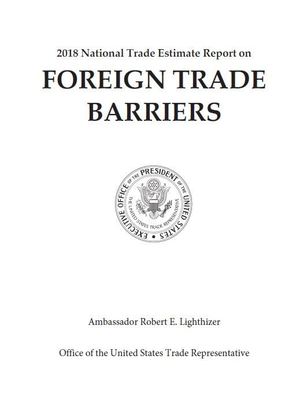Posted on : Apr.2,2018 19:05 KST
Modified on : Apr.2,2018 23:36 KST
 |
|
A USTR report on foreign trade barriers was released on Mar. 30
|
A report on non-trade tariff barriers was released the same week as KORUS FTA negotiations were concluded
 |
|
A USTR report on foreign trade barriers was released on Mar. 30
|
After the US renegotiated the South Korea-US Free Trade Agreement (KORUS FTA) – using import restrictions on steel based on Article 232 of the Trade Expansion Act as leverage – it is now expressing its dissatisfaction with South Korea’s import restrictions on American fruit. Even though the two sides completed three rounds of negotiations aimed at revising the KORUS FTA and declared they had reached a breakthrough in principle, the US still appears to be dissatisfied with trade.
A 2018 report about trade barriers that the US Trade Representative (USTR) released on Mar. 30 brought up the issue of non-tariff barriers to trade on American fruit, an issue it has never mentioned before. The USTR said it had asked South Korea’s Ministry of Agriculture, Food and Rural Affairs to improve a cherry export program and access to the South Korean market for blueberries produced in Oregon and other states. The report also stated that the USTR had asked South Korea to provide market access for apples and pears, whose import is currently forbidden, and that it would continue to ask South Korea to allow imports of the fruit in question.
In accordance with Section 181 of the Trade Act, the USTR publishes a report on barriers to trade that compiles difficulties in accessing foreign markets that have been reported by American stakeholders. The report addresses more than sixty of the US’s major trading partners, including South Korea, China the EU and Japan.
After reviewing the report on trade barriers, the Ministry of Trade, Industry and Energy said, “Aside from the request for further opening of the fruit market, the USTR’s references to automobiles, pharmaceutical prices, country-of-origin verification, competition policy, digital commerce and other issues were similar to previous years.” In regard to the issues raised by the report, the Ministry intends to devise countermeasures through deliberations between domestic stakeholders and relevant government ministries and to remain in close consultation with the US through channels including the various committees for implementing the KORUS FTA.
At the same time, the report gave a positive assessment to the renegotiation of the KORUS FTA, which was concluded on Mar. 27. The report stated that the US had managed to clear up non-tariff barriers to trade and regulations on a large number of items, such as doubling the quota for automobile safety standards. The report also noted that important implementation issues had been resolved in terms of customs and pharmaceutical products.
By Choi Ha-yan, staff reporter
Please direct questions or comments to [english@hani.co.kr]








